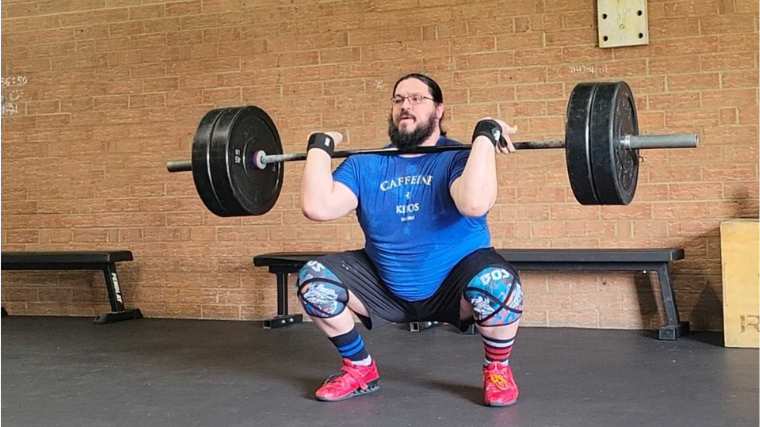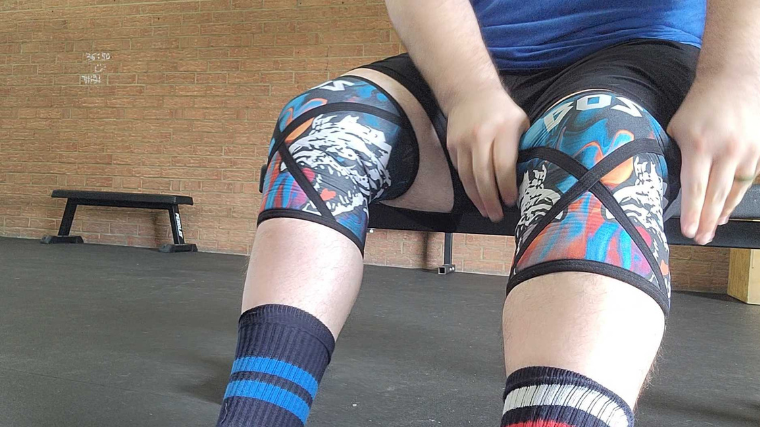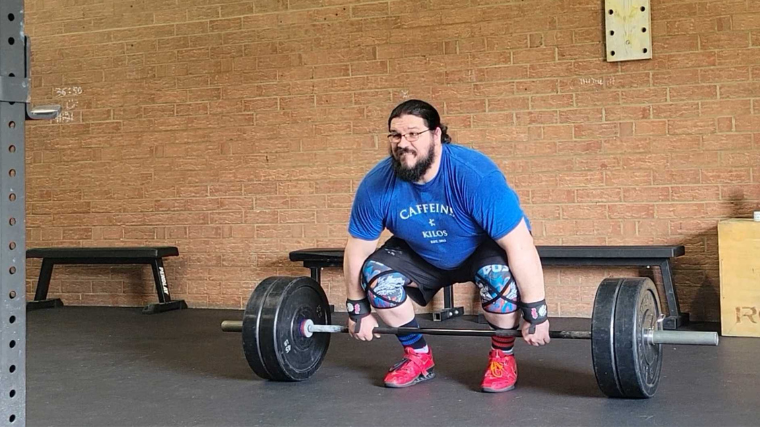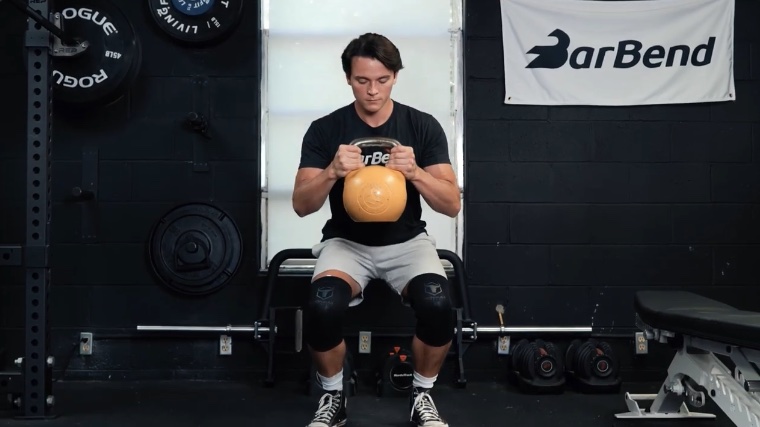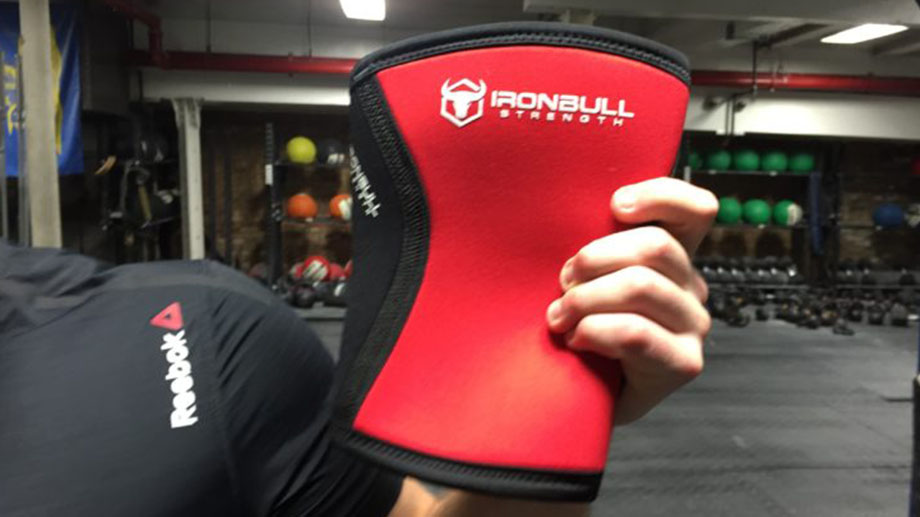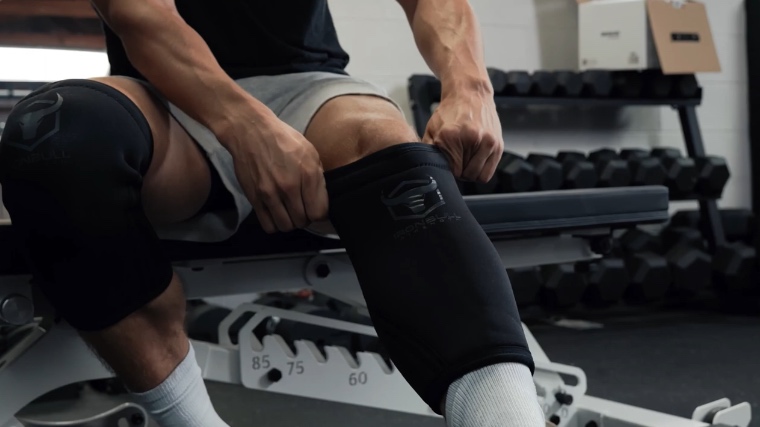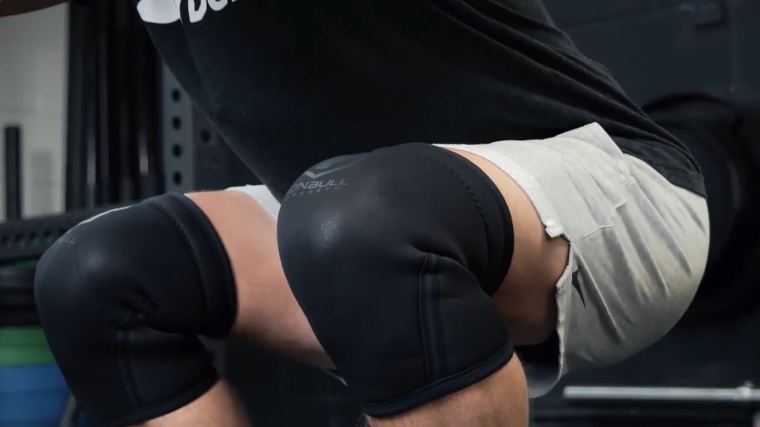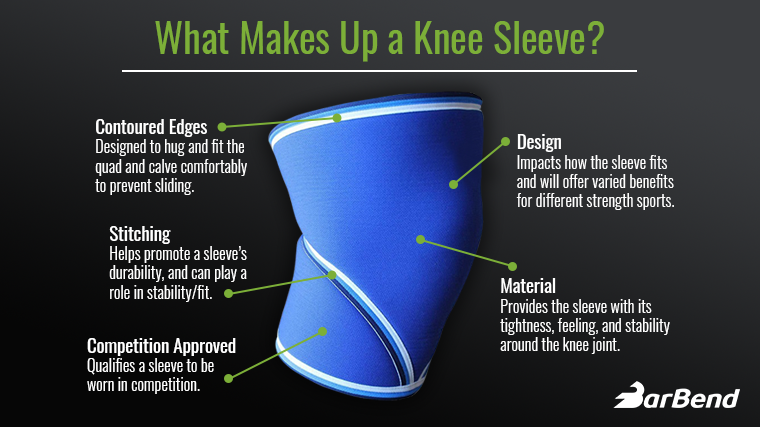Knee sleeves are an important piece of gear in every gymgoer’s equipment bag. They can help to provide joint protection, warmth, and stability. They can even help to inspire confidence when you know you have the right ones on, which is why we have compiled a list of what we think are the best knee sleeves on the market. Like most pieces of supportive equipment, their use comes with a time and place, so it’s not a bad idea to keep yourself equipped with a pair for times you need them most. A sleeve’s benefits will be dependent on your strength sport, preferences, and knee sleeve wants/needs.
We’ve been on a mission to find the best knee sleeves for powerlifting, weightlifting, CrossFit®-style workouts, knee warmth, and even heavy squats. Below are our current favorites, and keep in mind that this list was built off of our judging criteria for each knee sleeve, and you may find that a different fit from our top choices works better for you. Overall, our goal is to connect you with the best sleeves for your lifting preferences, or at least to make knee sleeves’ presence known to you if you’ve never seen them before.
Our Picks for the Best Knee Sleeves of 2024
- Best Knee Sleeves Overall: Gymreapers 7mm Knee Sleeves
- Best Knee Sleeves for Squats: Bells of Steel Knee Sleeves
- Best Weightlifting Knee Sleeves: Iron Bull 7mm Knee Sleeves
- Best CrossFit Knee Sleeves: Element 26 6mm Knee Sleeves
- Best Knee Sleeves for Powerlifting: Rogue 5mm Knee Sleeves
Editor’s note: The content on BarBend is meant to be informative in nature, but it should not be taken as medical advice. The opinions and articles on this site are not intended for use as diagnosis, prevention, and/or treatment of health problems. We are doing our best to keep this article updated based on what’s currently in stock at various manufacturers.
Best Knee Sleeves Video Review
BarBend expert tester and certified nutrition coach Jake Herod shares our picks for the best knee sleeves. Whether you’re looking for the best value, the best knee sleeves for squats, or the best knee sleeves for mobility, we’ve got you covered.
Best Knee Sleeves Overall: Gymreapers 7mm Knee Sleeves
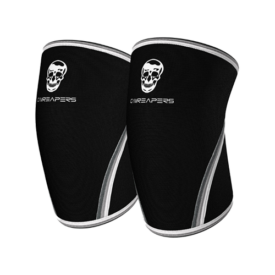
These neoprene knee sleeves come in three different color combinations, and with your purchase, you'll receive a free gym bag. They are constructed with reinforced stitching, and retain heat.
Specs
- Best For: Powerlifting, General Lifting, Bodybuilding
- Material: Neoprene
- Reinforced: Yes
- Sizes: Small through XX-Large (11.8 inches through 18.3 inches)
- Price: $59.99 per pair
Pros
- These knee sleeves have solid all-around support, comfort, and durability built into the design.
- Gymreapers used a non-irritating material, so these sleeves won’t irritate sensitive skin.
- The thick 7mm material provides maximum support and compression spread evenly around the knee that can stand up to heavy loads.
Cons
- These aren’t optimal for someone primarily looking for warmth.
- Athletes who would prefer a straight sleeve rather than a contoured sleeve might not like the design.
When picking the best knee sleeves, there are a number of factors that go into it. The best sleeves have to serve their purpose, have great construction, be reliable and durable, and accommodate the widest variety of users. That is why we decided to select Gymreapers 7mm Knee Sleeves as our top pick here.
Utility and longevity are the name of the game when crowning something the best, and to be the best, a product has to check off all of the right boxes (and then some).
These knee sleeves from Gymreapers are the real deal. They are made from premium neoprene and designed to provide warmth and joint protection, as well as support throughout even the most grueling leg workouts. They are made with reinforced stitching, and can slip on easily with a full range of sizes to fit even you quadzillas out there.
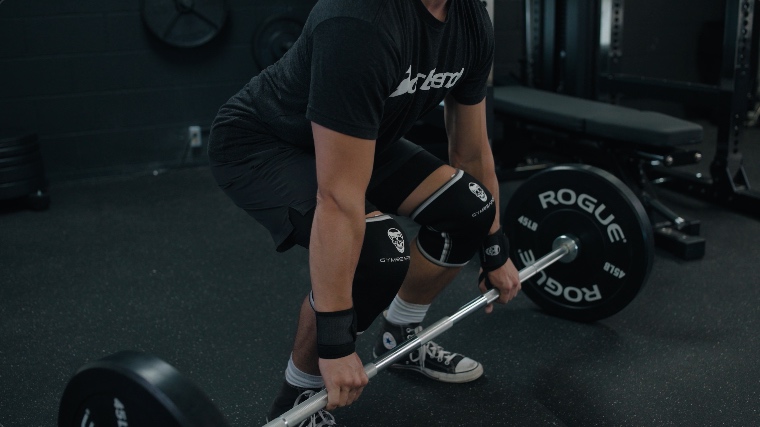
The Gymreapers 7mm Knee Sleeves are designed with the strength athlete in mind, and if you are going to be moving heavy weights, then these are going to be your friend. They are versatile enough to support a traditional bodybuilding style workout or CrossFit WOD, and accommodate repeated efforts.
Read our full review of the Gymreapers 7mm Knee Sleeves.
Best Knee Sleeves for Squats: Bells of Steel Knee Sleeves
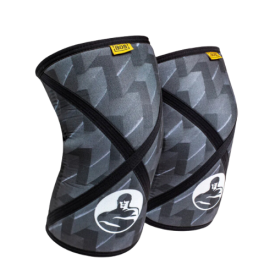
Support your knees with these 7mm knee sleeves from Bells of Steel. Made from neoprene, the reinforced cross-front design slips up and over your knee to provide warmth and added stability during your heavy lifts.
Specs
- Best For: Powerlifting, General Lifting, Bodybuilding
- Material: Neoprene
- Reinforced: Yes
- Sizes: Small through XX-Large
- Price: $39.99 per pair
Pros
- The 7mm thickness offers support during squats and heavy lifts
- Comfortable tapered design
- Neoprene keeps knees warm
Cons
- Compression sleeves can be difficult to slide onto knee
- No loops to help pull on
Knee sleeves and squats go hand in hand — or better yet, knee-in-sleeve. When looking for sleeves to aid your squat performance, they should be supportive, comfortable, and durable since they are supposed to be protecting the knees while lifting heavy loads. These Bells of Steel Knee Sleeves hit the mark.
One big reason we picked Bells of Steel Knee Sleeves as our top choice for squats is their ability to stand up to repeated heavy squats and leg sessions. Built out of neoprene, the 7-millimeter thickness offers warmth, compression, and stability for those who train in both high-bar and low-bar squats.
However, getting these sleeves up and over your calves and knee can be an unexpected addition to your workout. “Getting them on was a struggle because of the compression element, and I wish they had some loops or a pull tab to help. But once they were on, they felt great,” says our tester, a USA Weightlifting Level 1 coach. “The rough exterior feels like they’ll stand the test of time, and they offer a good amount of support when I’m doing Olympic lifts.” Overall experience scores a 4 out of 5 while adjustments scores a 3 out of 5.
While it can take some effort to slide these knee sleeves on, once set in place, our tester finds them incredibly cozy. “They didn’t move around and the tapered design made for a really comfortable fit,” they say, giving comfort and feel a score of 5 out of 5.
The added warmth from this sleeve can also help to keep your knees prepped and ready for the workload ahead. If you are looking to tackle back squats, front squats, and all the other variations of this knee joint-focused move, we’re confident these can help.
Best Weightlifting Knee Sleeves: Iron Bull 7mm Knee Sleeves
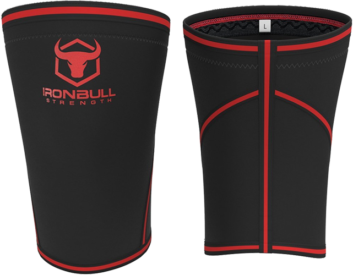
A supportive and versatile knee sleeves that's designed with 7mm neoprene. These are available in a variety of colors and offer maximum support.
Specs
- Best For: Weightlifting, CrossFit, Warmth, Everyday Wear
- Material: Neoprene, silicone
- Reinforced: No
- Sizes: Small, Medium, Large, X-Large, XX-Large
- Price: $59.99 per pair
Pros
- Iron Bull’s 7mm sleeves offer optimal support and compression to take pressure off your joints for weightlifting sessions.
- The flexible and thin neoprene won’t hinder mobility or range of motion.
- These are available in seven different colors and a wide size range.
Cons
- Beginners might not have a specific need for knee sleeves yet in their careers.
- These aren’t reinforced.
- There are cheaper options on the market.
The best knee sleeves for weightlifting need to provide support, but not limit mobility in exercises like the snatch, clean & jerk, and squat. You want length on your sleeve to get as much joint support and pressure relief as possible. The Iron Bull 7mm Knee Sleeves are a prime option for weightlifting enthusiasts.
If you watch any weightlifting competition you’re sure to see these knee sleeves on some of the athletes competing. The thinner material of the sleeves (7mm to be exact) allows for a comfortable and complete range of motion with minimal bunching, especially when moving through large ranges of motion, as you do in Olympic lifts. If you’ve had other knee sleeves catch on the bar, you’ll be happy to know that these are designed to prevent catching.
Thanks to their full 11.5-inch length, these sleeves are two inches longer than most other brands, offering more support. You can snag these in five different sizes (small to xx-large) and seven colors, including black/blue, black/charcoal, black/green, black/grey, black/pink, black/purple, and black/red. While these are high-quality sleeves, they’re a little pricey at around $59.99 per pair.
If you’re a competitive weightlifter or practice the Olympic lifts often, it’s hard to find a more supportive weightlifting sleeve option than Iron Bull’s 7mm Knee Sleeves. They’re designed to provide support and warmth without sacrificing the mobility that you need for weightlifting.
Best CrossFit Knee Sleeves: Element 26 6mm Knee Sleeves
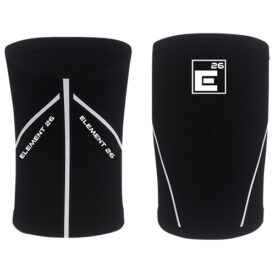
These competition-approved, anatomically-contoured knee sleeves are made of 100 percent non-irritating neoprene material. They are six millimeters thick and provide compression alongside their reinforced stitching.
Specs
- Best For: Weightlifting, General Lifting, Bodybuilding, CrossFit
- Material: Neoprene
- Reinforced: Yes
- Sizes: Small through X-Large (13 inches through 19.5 inches)
- Price: $39.99 per pair
Pros
- These are great for functional fitness sports such as CrossFit since they provide a good amount of support for workouts that can be tough on the knees.
- Element toes the line between support and mobility with these sleeves.
- The contoured design helps to prevent bunching behind the knee.
Cons
- Folks who want knee sleeves that don’t provide as much compression will want to look elsewhere.
- These don’t fit neatly into one category, so some people may pass them over for a more specified option.
CrossFit® and functional training are chock full of movements that are taxing on the knees and joints. That is why it is important to have gear — like this pick — that you can rely on to provide much-needed support throughout even the hardest WODs.
Since a lot of the movements require a substantial degree of flexibility at the knee and hip, the thicker knee sleeves can sometimes impair that mobility, and many athletes prefer knee sleeves with similar support and compression without the added bulk — that’s why we picked the Element 26 6mm Knee Sleeves as our top choice for CrossFit knee sleeves.
These heavy-duty neoprene knee sleeves are designed with reinforced stitching and provide compression to the knee evenly all around to provide confidence that they can support you through even the toughest WODs. They do double-duty work as well since they are also great for support for your max effort attempts. Each sleeve is 10 inches long to ensure complete coverage of the knees and at 6mm, these sleeves offer slightly less bulk than traditional 7mm knee sleeves.
These sleeves are likely to provide added stability to the knee joint, which athletes who perform single-leg movements like pistol squats and lunges will appreciate. They come with a lifetime warranty and are priced lower than a lot of comparable sleeves which makes these a great value, in our opinion.
Best Powerlifting Knee Sleeves: Rogue 5mm Knee Sleeves
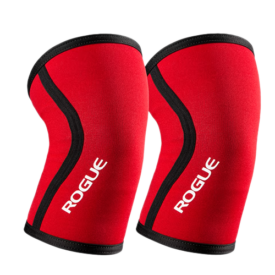
These knee sleeves are thick enough to provide support, warmth, and compression while still being thin enough to prevent bunching and pinching. You can choose from from pre-selected colors or customize your own design using Rogue's Zeus feature.
Specs
- Best For: Weightlifting, Powerlifting, General Lifting, CrossFit, Everyday Wear
- Material: SBR (Synthetic Rubber) and Neoprene
- Reinforced: Yes
- Size: X-Small through XX-Large (12.2 inches through 18.1 inches)
- Price: Starting at $49.50 per pair
Pros
- Allowed by IPF and IWF
- Provides joint compression and warmth
- Fully customizable via the Zeus feature
Cons
- May want a thicker sleeve for more stability and compression
- Pricey option
- Some may prefer a straight fit rather than the contoured fit
Competitive and recreational powerlifters alike know that a good pair of knee sleeves can separate a successful squat session from a bad one. Rogue Fitness is well known as a leader in the fitness industry and their reputation doesn’t dissapoint with their 5mm Knee Sleeves. They can work for powerlifting main lifts such as squats and deadlifts, or provide support while moving through accessory work. They are even a solid choice for those who just like doing heavy barbell training.
To perform well in the squat and deadlift you need a durable pair of sleeves that can provide stability and support through your heavy lifts. The Rogue Fitness 5mm Knee Sleeves can go the distance and then some. Not only are these sleeves made from a durable synthetic rubber and neoprene that can provide compression and warmth to your knee joints, but they’re allowed in IPF and IWF competitions so you can head into your meet without any curveballs.
Rogue designed these knee sleeves to provide warmth and light support while still allowing for the full range of motion you need to train properly. The contoured configuration helps to prevent the material from bunching when bending, which is common with thicker sleeves. You can sit deep into a squat with these on comfortably, and likely not experience any pinching while still receiving noticeable support. However, if you prefer a straight fit, you may want to look elsewhere.
While they’re priced at $49.50 per pair, there’s also an option to customize the design with colors, logos, or your own uploaded design. Using the Zeus feature to do this will lift the price of these knee sleeves to $70 per pair. They aren’t the cheapest option on the market to support your efforts, whether you’ve been lifting since you were a wee-babe or just getting into powerlifting over 40 years of age, so if you’re looking for a bargain, there are better picks for you on this list.
Benefits of Knee Sleeves
Knee sleeves are popular in just about every circle of fitness. They’re as pervasive in commercial fitness centers as they are in dingy powerlifting dungeons and CrossFit boxes. So what gives? What benefits do they provide? Let’s break it down.
Support and Compression
The first thing you’ll notice when you put on a pair of knee sleeves for the first time is that they can be quite a workout to slip on, especially if you’ve picked up a particularly tight pair. Knee sleeves are made from materials like spandex and neoprene so that they can provide compression to the knee area. This compression has a few different purposes, but most people use knee sleeves for support. The compression can potentially act as a non-rigid brace to support the structure of the knee and keep everything in line. They might even provide a small amount of assistance in squat-based movements. Another reason compression is helpful is that it may help to provide some pain relief and even might help reduce swelling.
Warmth
Aside from support and compression, knee sleeves are usually intended to provide warmth to the joint. The parts of your knee that provide lubrication for smooth operation of the joint like synovial fluid and bursa sacs perform better when they’re warm. Just think about how much more limber you feel on a hot day than a cold and blustery one. Knee sleeve materials work double-duty to not only enhance compression but potentially keep the joint warm and functioning at peak performance.
How We Tested and Chose the Best Knee Sleeves
Knee sleeves may look simple, but they’re not as straightforward as they seem. Throughout our best knee sleeve search, we looked at multiple aspects that make up a great sleeve. First, we considered the knee sleeve’s stability, thickness, and material. Neoprene and cotton are the most commonly used materials. Next, we looked for the mobility or rigidity of the sleeve during a variety of movements. After that, we assessed the sleeve’s ability to keep our joints warm during a workout. Finally, we looked at the construction and durability, or actual design of the sleeve, and how it may function for certain athletes.
Other design features for consideration are the stitching placement and quality, as well as whether the edges are contoured or not. If you plan on competing, you’ll want to check if the sleeves are approved for competition by your chosen federation’s governing body. We expand on these considerations below.
[Related: Pros And Cons Of The Safety Squat Bar For Front Squats]
Knee Sleeve Stability and Material
A knee sleeve’s material will often influence how stable a sleeve is under the bar. The most common material used in knee sleeves is neoprene, which is composed of a family of synthetic rubbers. This material is used for a variety of applications but has gained popularity in lifting due to its ability to remain flexible and stable over time.
The thickness of neoprene will also add to a sleeve’s stability. Common neoprene thicknesses range from three to seven millimeters, and the most common thicknesses used by strength athletes are five millimeters and seven millimeters. Competitive Weightlifters can be seen using a variety of knee coverings from sleeves 3mm thick, knee wraps, and oftentimes 7mm thick sleeves. Other materials used in addition to neoprene are nylon, spandex, and various cotton blends. The mixture of these materials with neoprene is what gives sleeves their soft flexible nature.
Nylon and spandex are often used in lighter sleeves and tend to be more form-fitting to the joint. These materials stretch very well and allow a sleeve to hug the knee tightly without slippage. Cotton is another common material you’ll find in a sleeve and give them their soft texture on the skin. With our stability assessments, we analyzed a sleeve’s actual make and the activity it was being applied to.
[Related: Best Macros Calculator]
Mobility and Rigidity
This measure has a lot to do with the above point and often comes down to a sleeve’s thickness. A thicker sleeve will often limit mobility, and provide more support throughout movements. Conversely, thinner sleeves will work best with mobility-focused athletes like Olympic lifters and functional fitness athletes. Material plays a role in this assessment, but so does the actual knee sleeve design.
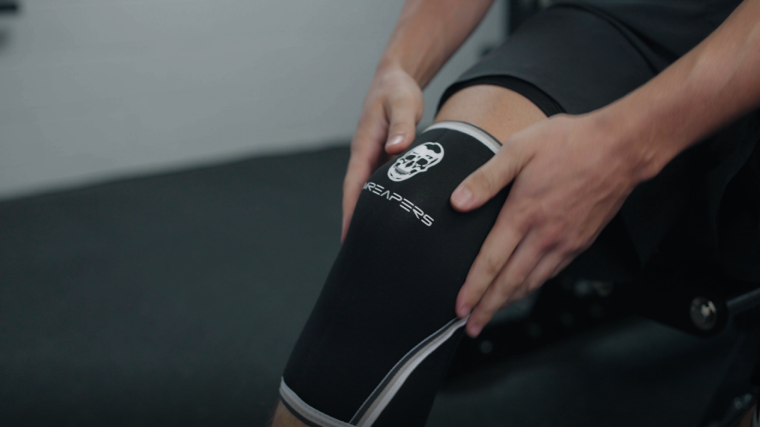
For this assessment, we analyze how a sleeve follows the joint in different movements. A more mobile sleeve won’t hinder performance due to mobility issues. On the flip side, when we analyzed a sleeve’s rigidity we looked for support in bottom lifting positions. For example, the bounce coming out of the hole on a squat.
[Related: Choose The Perfect Knee Sleeve]
Joint Warmth
Before sleeves became popular for recreational lifting purposes, they were often used solely for joint warmth. In fact, some athletes use sleeves without even realizing that one of their primary functions is to keep the knee warm. Material, strength, sport, and fit will all play a role in this factor, as the level of compression will also influence some of the joint’s warmth under a sleeve.
In our warmth assessments, we look at multiple factors that influence a sleeve’s ability to keep the joint warm. For example, we took into consideration how the sleeve fit and what type of material it was made of. The main factor we looked for was simple: how the actual sleeve worked to keep the joint warm.
Construction and Durability
There are a lot of ways that knee sleeves can be designed, so we tried to identify as many as we could. For example, different sleeve designs include four-panel, tapered, and cylinder. These different forms of construction will influence almost every other factor that will cater a sleeve’s perfect fit to you.
The most common sleeve design is a tapered fit, which is your standard fitting sleeve. This sleeve is versatile and will work for multiple athletes in a variety of sports, an example of this would be the Gymreapers 7mm Knee Sleeve. The cylinder-esque design is most commonly used in more rigid sleeves like Exo and Gymreapers sleeves. The four-panel design is the least common of the three and has multiple pieces of material sewn together into one sleeve.
Different sleeve constructions will come with different rates of durability. For example, some sleeves have reinforced stitching, which can range from hooked stitching to quadruple stitching. In addition to a sleeve’s stitching style, the placement of stitching also matters for durability. You don’t want the stitching to be in a place that is making constant contact with knurling, as this will cause them to fray quicker, thus reducing their durability and longevity.
Another method to predict a sleeve’s durability is to look at its edges. Most sleeves have hemmed or enclosed edges that will prevent them from ripping or fraying prematurely. Also, the tighter a sleeve’s edges are cared for, then the less chance you have of them stretching out over time.
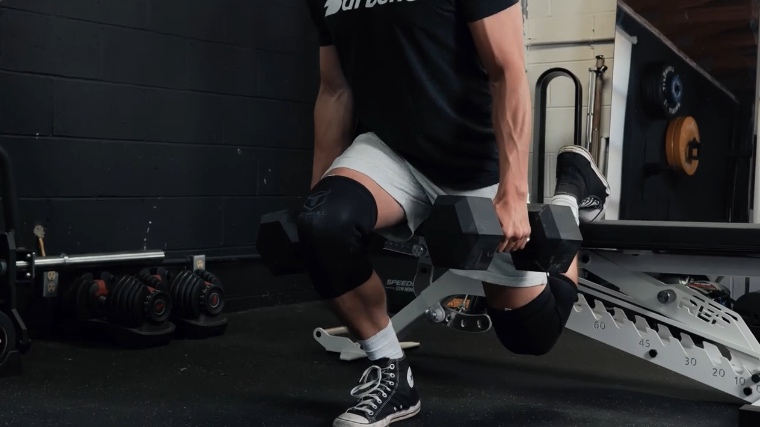
Possibly the biggest factor in a sleeve’s durability is the material used. A good sleeve will utilize a high-grade neoprene, spandex, nylon, or blend mixture that doesn’t stretch out quickly under constant load.
[Related: Nutrition For Bulking]
How Much Do Knee Sleeves Cost?
Knee sleeves range in price, much like any other piece of lifting gear. The disparity in cost is due largely to the quality and longevity you can expect from the product. Cheaper knee sleeves, which usually run between $20 and $30 for a pair, generally lack reinforced stitching and will start to show signs of wear after a few sessions.
| Best Knee Sleeves Overall | Gymreapers 7mm Knee Sleeves | $59.99 |
| Best Knee Sleeves for Squats | Bells of Steel Knee Sleeves | $39.99 |
| Best Weightlifting Knee Sleeves | Iron Bull 7mm Knee Sleeves | $59.99 |
| Best CrossFit Knee Sleeves | Element 26 6mm Knee Sleeves | $39.97 |
| Best Knee Sleeves for Powerlifting | Rogue 5mm Knee Sleeves | Starting at $49.50 |
Higher-end knee sleeves, on the other hand, are often double stitched, hold their stronger elasticity for longer, and often will have anti-microbial linings or properties already built-in to prevent the all-t0o-familiar stinky knee sleeve smell. These sorts of options will range from around $40 per pair to $60 or $70 per pair. They’ll often come with a warranty as well so you know how long you can expect the sleeves to perform at their best.
Types of Knee Sleeves
Knee sleeves come in a few different types, but there are generally one of two categories they fall into — open compression and closed compression.
Open Compression Sleeves
This type of knee sleeve is more often seen in rehabilitation settings and might be worn for longer stretches, even hours at a time. It is easily identified since it has an opening, often on the front where the kneecap is. It may also have straps to adjust the compression. Open compression sleeves offer a few advantages but they have drawbacks as well.
- Breathability: Since the open compression sleeves have a gap for the patella, they allow for improved air circulation and dissipation of heat.
- Flexibility: The open design of this type of sleeve allows for improved freedom of movement which might be better for exercise that requires a lot of repetitive movements such as running or jumping
- Comfort: Due to these being the type of sleeve that some people wear for hours or even all day, they are designed for comfort and often have variable compression through the use of velcro straps
You may find that open compression sleeves don’t provide the same level of pressure around the joint as closed compression sleeves due to the gaps and openings. They also don’t offer the same amount of stability as closed compression sleeves.
Closed Compression Sleeves
These sleeves are the more common type you’ll find in the gym. Closed compression knee sleeves don’t have any openings except where your leg goes through them. They’re more like a tube in shape, though they may be contoured to provide a more ergonomic fit. They offer top-notch performance for lifters and more compression than other options.
- Enhanced Stability: Thanks to the continuous coverage of the joint, closed compression sleeves may provide a more snug fit for superior reinforcement during high-force movements and lateral or twisting exercises.
- Increased Compression: The added compression might be better for people who are looking to gain a bit of assistance out of the bottom of a squat. It may also be helpful for people who are trying to alleviate mild swelling, tendonitis pain, and inflammation.
The extra pressure and closed design may cause some discomfort, especially for first-time wearers or people with larger legs. These types of sleeves also tend to retain heat more than open compression designs which might become uncomfortable during especially hot or humid workouts.
How to Pick the Best Knee Sleeves for You
There are multiple reasons an athlete can utilize a knee sleeve. Below are a few examples of when different specific strength athletes will reach for a sleeve. Also, we’ve created our own knee sleeve that aims to match the criteria we assessed all of the knee sleeves below.
Why Athletes Use Knee Sleeves
The three main types of lifters that will wear knee sleeves are powerlifters, weightlifters, and CrossFit or functional training athletes. For the sake of simplicity, we’ve lumped recreational athletes in with CrossFitters because they have less specific needs as well. Here are three primary reasons why athletes across a variety of strength sports take advantage of the benefits knee sleeves offer.
- Powerlifters will typically use a sleeve to support their knee’s stability in squats, quad, and hamstring training. Oftentimes a stiffer, more rigid sleeve will be this athlete’s go-to since they’re training with heavier loads frequently. Sleeves can help an athlete build confidence in their heavy movements, and provide the knee added compression. In addition, there are a few sleeves that are approved for competition, so they’ll offer stability and joint warmth over extended rest periods. Thicker knee sleeves also tend to offer a bit of assistance at the bottom of a squat with getting out of the hole.
- Weightlifters will utilize a sleeve for light joint support and warmth. These athletes will need a sleeve that’s mobile and follows the joint without inhibiting mobility. Since this athlete is often catching the weight in the bottom of a squat, a sleeve can’t limit their ability to achieve depth, so thicker, more rigid options are usually not ideal. Also, this athlete will be taking longer rest periods, so a lighter sleeve can be useful for remaining comfortable and maintaining joint warmth in-between sets.
- CrossFit, functional, and recreational athletes will utilize a sleeve that fits their specific needs best. This athlete performs a variety of movements throughout one workout, so a sleeve that’s versatile is often their best fit. Support, mobility, and design will all play a role in how the sleeve impacts their performance. For example, someone starting CrossFit, or possibly more cardio-based movements, may reach for a lighter sleeve so they don’t feel confined/limited by a stiffer neoprene sleeve.
Knee Sleeves vs. Knee Braces vs. Knee Wraps
In this triple-threat match for the World Heavyweight Championship, three similar yet vastly different pieces of knee support equipment face off. Knee sleeves are single pieces of tube-like material that are designed to help potentially provide warmth and light compression to the knee area for better stability, flexibility, and confidence when lifting or moving around in everyday life. Knee braces, on the other hand, are often worn for rehabilitation purposes to provide a larger amount of support and may even have built-in restrictions to keep you from going past a certain range of motion. They may also prevent lateral and medial movement of the knee joint to protect the MCL, ACL, and LCL.
Knee wraps are long stretchy strips of elastic-like material that are wrapped extremely tightly around the knee joint with the sole purpose of improving lifting performance and providing aid during squats. You’ll most often find them being used in powerlifting and occasionally weightlifting competitions.
Best Knee Sleeves FAQs
How much do knee sleeves cost?
Knee sleeves, like any piece of lifting gear, range in price from relatively inexpensive at around $20 per pair — which may only last a few lifting sessions — to the most expensive, high-end sleeves at around $60 or more. Higher-end knee sleeves tend to hold their elasticity better, are generally made to last longer, are occasionally customizable, and often even have anti-microbial linings.
What do knee sleeves do?
Knee sleeves are intended to keep heat in and around the knee joint to warm the synovial fluid and better lubricate the joint, potentially allowing for better movement. They’re also designed to provide light compression which may aid in the stabilization of the joint and even may alleviate pain.
Do knee sleeves really work?
Knee sleeves aren’t magical and can’t prevent all injuries or heal all strains, but they perform their intended job very well if you wear a pair of high-quality, well-fitting wraps. They provide warmth to the joint which may help improve function and compression which might aid in stability and pain relief. They’re also a pretty effective placebo for a lot of people, too.
How do you measure knee sleeves?
There are two important measurements regarding knee sleeve sizing. First, you’ll want to figure out how long the sleeves are and if you like the length of them. That’s pretty straightforward — simply measure from the top of where you’d wear the sleeves and see where a particular pair would end up based on their length.
The second measurement is crucial to get right, and it’s the circumference of your knee. You want to measure with a tailor’s tape measure or string around the middle of your knee with a slight bend. Assuming you want knee sleeves with a bit of compression and support, select the size that’s just below that measurement. For example, if you measure 15 inches and the sizes say 13-15 inches and 15-17 inches, order the smaller pair for extra compression.
What is the best knee sleeve?
The best knee sleeve is a combination of multiple attributes. For starters, great construction is the first sign of high quality knee sleeves. Ideally, you want a sleeve with neoprene that is void of excess stretching, and you want reinforced stitching to prolong durability. Another sign of high-quality knee sleeves is a warranty, as this shows a company’s confidence in their product. For us, we think the Gymreapers 7mm Knee Sleeves are the best knee sleeves on the market right now because they check all those boxes, and then some.
What are the benefits of knee sleeves?
Knee sleeves offer multiple benefits for fitness enthusiasts and strength athletes. Their main benefit is providing a light level of support around the knee joint.
Another major benefit is that they provide warmth to the knee joint, which is beneficial for athletes working out in colder settings or want help warming-up. Lastly, they can be a tool for providing mental reassurance under heavy loads.
